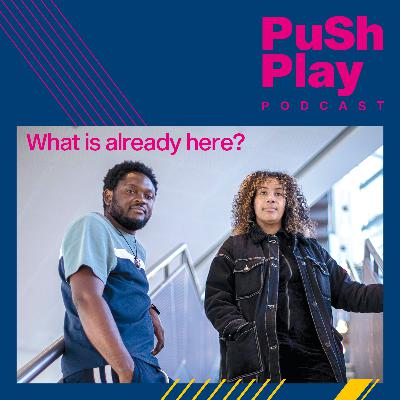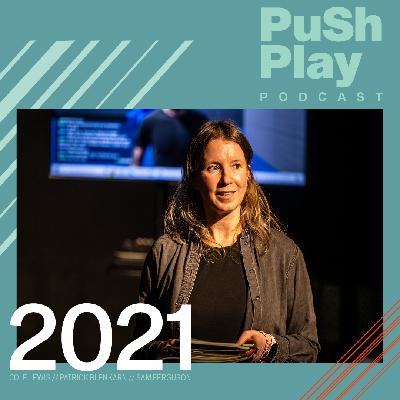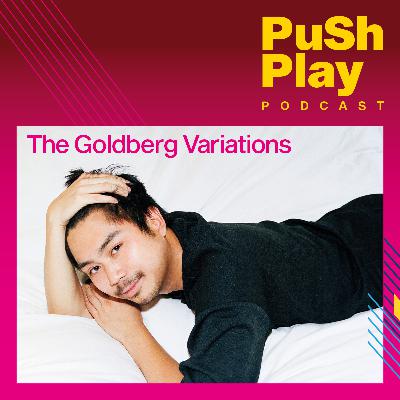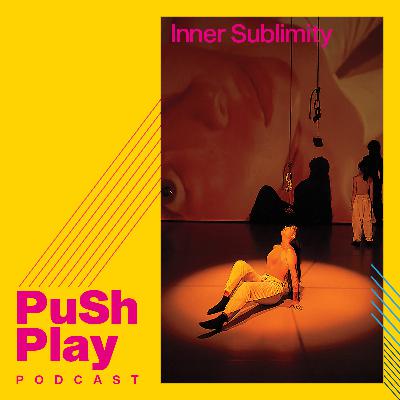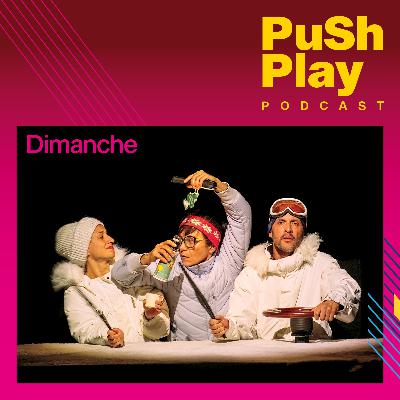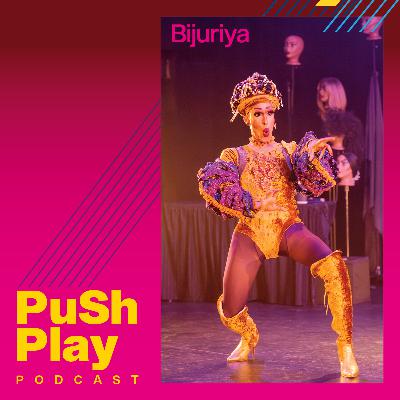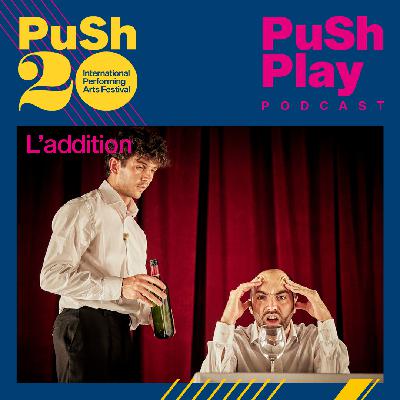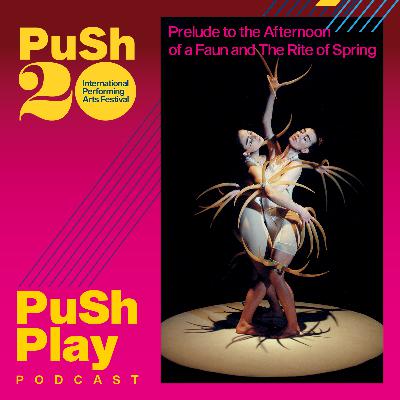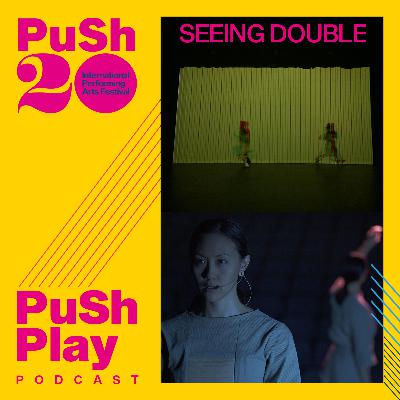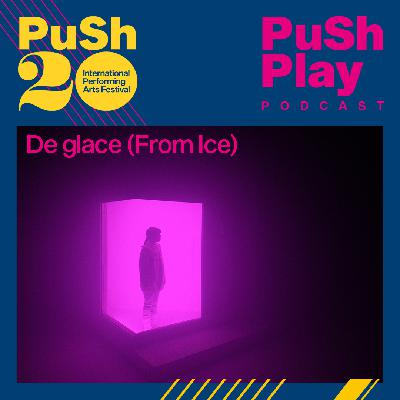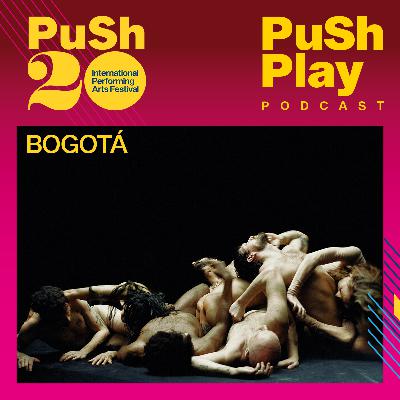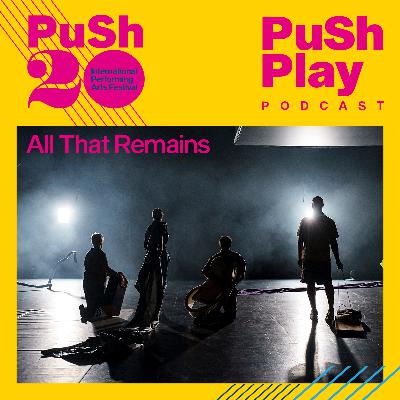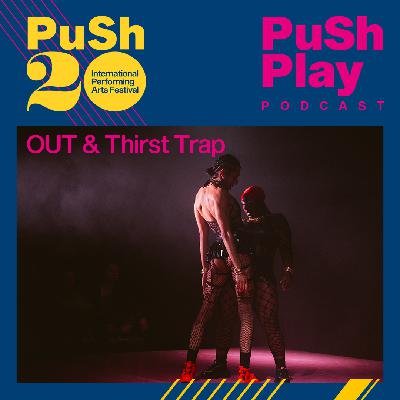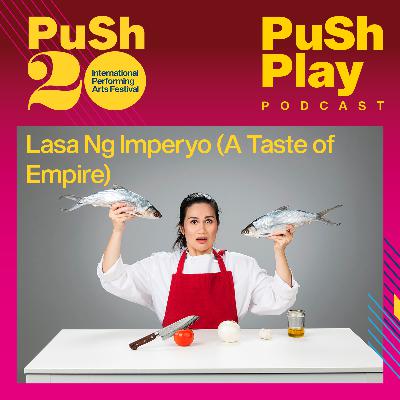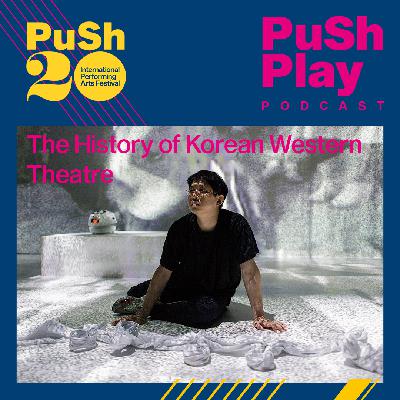Ep. 55 - Finding and Meeting the Other (What is Already Here?)
Description
Gabrielle Martin chats with Majula Drammeh and Joseph K Kasua. They are presenting a special studio showing and discussion of What is already here? at the 2025 PuSh International Performing Arts Festival. Check out the show on February 7 at the VIVO Media Arts Centre.
Show Notes
Gabrielle, Majulah and Joseph discuss:
-
For your show, What is Already Here, which stemmed from a 2022 installation, what was the evolution of the project and what were the themes explored? How did it start?
-
How did the pandemic influence the creation process?
-
How have themes of extraction, colonialism and digital technology weave into the work?
-
Why did you choose to call this a "futuristic afro-play" and what do you mean to achieve with this form?
-
What is your collaboration like, given your different points of departure? What drew you to work together, and how do your practices complement one another?
About Majula Drammeh
I am a performer, dancer, dramaturg and performance maker based in Stockholm and Malmö, Sweden. My main focus is on interactive, participatory immersive work within the fields of dance and performance as well as somatic practices. I am looking to explore how these can act as a bridge for people to participate and discover themselves in an open, permissive and inclusive way. In the interpersonal.
I am interested in giving space for both audience/ participants and performers to deal with their own bodily identity and the political baggage it carries. And I strive to present interactive performing arts where the body of the minority is the norm, and hopefully contribute to the decline of history-less of which the non-white body is consigned too.
As a performer and dancer my focus is on using somatic practices and experiences to create a focus that is vulnerable, present and invites the participant to be present with themselves too. I use my choreographic and improvisational experiences to find methods of meeting the room, space and objects to create a relational bridge to them. These are also methods I communicate in my teaching.
I work as a dramaturg for mainly dance artists and I am intrigued with processes and the path they lead the work on. How, with close attention, the process reveals the very core of an artist's work and clarifies what decisions need to be made when we listen closely.
I grew up in Hjulsta/Tensta suburb of Stockholm, Sweden.
I studied at the Dance and Circus School in Stockholm in 2006 and received my bachelor's degree in dance from Laban Center London (2009) and in 2021.I received a master's degree in performing arts from Stockholm University of the Arts.
I have been teaching at Stockholm University of Arts and The Royal Danish Art Academy amongst others.
About Joseph K. Kasua
Born in Lubumbashi in 1995, Joseph K. Kasau Wa Mambwe is a visual artist, filmmaker and author based in Lubumbashi. He holds a degree in Information and Communication Sciences from the University of Lubumbashi, specialising in Performing Arts (Audiovisual, Cinema and Theatre).His passion for art started very early in Lubumbashi's cinemas, and was nourished by multiple visual influences that later formalised in his artistic practice, which is situated at the intersection of cinema, video art, photography, creative writing and addresses in his work the complexity of memory and identity in a postcolonial urban context. He is a fellow of the Trame 2022 residency at the Cité Internationale des Arts in Paris, of the Delfina Foundation residency programme in England on food politics, of the Tri-continental Quilombo project (DRC - SWITZERLAND - BRAZIL) from 2021 to 2023. Kasau Wa Mambwe also works as a Fixer, Assistant Director, Editorial Assistant and as a Communication Officer for African and Western structures and collectives, among others Les Films de la Passerelle (Belgium), the Lubumbashi Biennale (2019), Museum of Tervuren (Belgium), PODIUM Esslingen (Germany) and GROUP50:50 (DRC - SWITZERLAND - Germany).
Land Acknowledgement
This conversation was recorded on the unceded, stolen and ancestral territories of the Coast Salish Peoples: the xʷməθkʷəy̓əm (Musqueam), Skwxwú7mesh (Squamish) and Səl̓ílwətaɬ (Tsleil-Waututh), colonially known as Vancouver.
Majula joined the conversation from Stockholm, Sweden, and Joseph joined from Lubumbashi in the DR Congo.
It is our duty to establish right relations with the people on whose territories we live and work, and with the land itself.
Credits
PuSh Play is produced by Ben Charland and Tricia Knowles. Original music by Joseph Hirabayashi.
Show Transcript
Hello and welcome to Push Play, a Push Festival podcast featuring conversations with artists who are pushing boundaries and playing with form. I'm Gabrielle Martin, Push's Director of Programming, and today's episode highlights interpersonal processes and works that give birth to themselves. I'm speaking with Majula Drammeh and Joseph K. Casao-Wamambue, Push artists in residence who will be developing their work, what is already here, in residency during the festival and sharing the studio showing and conversation on February 7th, 2025. In a world fixated on unyielding technological progress, this interactive theater installation in development urges audiences to reconnect with the tangible through a resounding affirmation of collective belonging. Set in a subterranean laboratory built from discarded electronic waste, the work in development draws on ancestral wisdom and Afro-futurist divisions, inviting participants to challenge their digital dependencies and rediscover what it means to be human in a time of digital alienation. Born and based in Lubumbashi, Democratic Republic of Congo, Joseph K. Casao-Wamambue holds a degree in information and communication sciences from the University of Lubumbashi with a specialization in performing arts. From theater and cinema to photography, installation and creative writing, Joseph's work addresses the complexity of memory and identity in a post-colonial urban context. Rooted in dance and choreography, Majula Drammeh's artistic practice explores how the performing arts can provide spaces for interpersonal relationships, addressing vulnerability and challenging societal norms. Her work often exists in non-traditional theater spaces and asks the participants to fully emerge themselves in topics such as time consumerism in a capitalist age. Here's my conversation with Joseph and Majula. It's really nice to be in conversation with you today. I'm really looking forward to chatting with you more about this project, about your practice. Thank you for joining me. I know it's evening where you are, it's morning where I am. I'm going to start by just acknowledging where I am joining this conversation from. So I am on the stolen ancestral and traditional territories of the Coast Salish peoples, the Musqueam, Squamish and Tsleil-Waututh. And as a settler here, it's important. I'm responsible to continue my thinking and education on what the history of colonization looks like here and its implications and ongoing effects today. And I think something that's really interesting is thinking and learning I've done around the different types of colonialism and their impacts today and how that affects what colonization looks like today or neocolonialism based on where we are.
With my own background, my father coming from Zimbabwe, colonization now looks much different than it has here in Canada. And so, you know, I think that's important in framing the difference specifically between settler colonialism, where large numbers of settlers claim land, become a majority, and often employ a logic of elimination, engineering the disappearance of the original inhabitants versus an extractive colonialism where colonizers, you know, destroy or push away indigenous inhabitants to access resources, but more typically depend on mediation and the labor of the indigenous peoples. And and then other forms like planter or trade colonialism, and this is there's one kind of very simple and nice reference, a typology of colonialism by Nancy Shoemaker. That's a great reference. And so that's kind of some of my thinking today that I wanted to share. And Joseph and Majula, could you please share where you are joining the conversation from?
So I'm joining the conversation from Lumbashi. Lumbashi is, I can say, the second biggest city in the Republic Democratic of Congo. It's a city full of mining and exploitation, so it's really related to the colonialism history that you were talking about. And I was born here, and I've always acknowledged that Lumbashi, as a qualification, they say that it's a copper city. And for all my life, I haven't really been in touch with th

